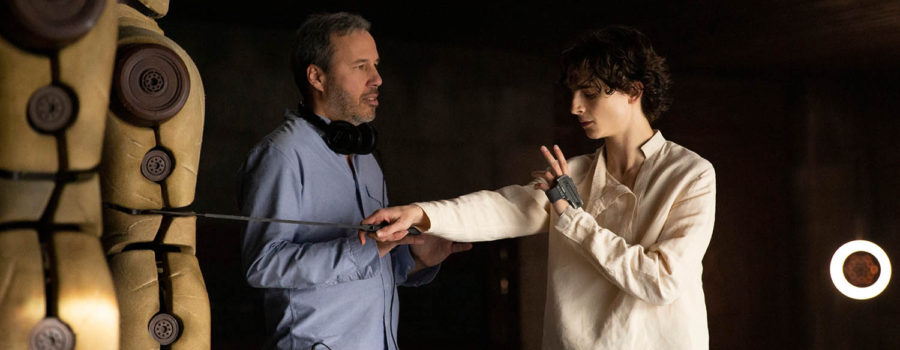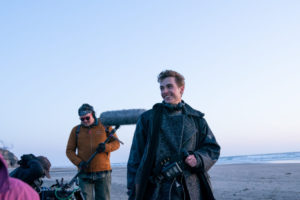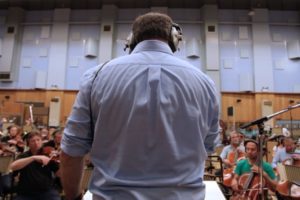A complex, world-building novel, Herbert’s book is about the perils of imperialism and worshipping false idols, about exploitation, preservation of culture, and the importance of history, about the savagery of war and wayward foreign policies. Which means that it’s easy to see why the book appeal to Villeneuve, as one or more of those themes are also present in his other work, such as Polytechnique, Incendies, Sicario, and Blade Runner 2049.
At the Mill Valley Film Festival last week, where Villeneuve was presented with the MVFF Award, I had the chance to sit down with the filmmaker and discuss his vision of Herbert’s book. Our conversation covered how he wanted to honor his childhood imagination of Dune, how he sees it as an entirely separate work from Lynch’s adaptation, and the undertones that he perceives in the novel that he wanted to bring to the fore for his two-part production.
I saw Dune yesterday on IMAX and the experience was incredible.
First of all, thank you. I deeply appreciate that you watched it on the big screen because it is a movie that was dreamed, designed, and shot as a love letter for the big screen. I keep repeating that. But that’s the truth, because our early meetings with Greig Fraser, the cinematographer, were all about how we could try to embrace the full power of the big screen. Every camera movement, everything was thought about seeing it on IMAX.
What was the production process like, and did it bring out the little boy in you?
It’s tricky trying to bring to life one of your old dreams. The risk of disappointing yourself is very high. And what I tried to really do, like an archeologist, was to go back in time to dig, to bring back to the light those images that I had seen as I was reading the book in my early teens. And to honor those images. There’s something so pure when you’re young, and you read the book and get these uncorrupted images from your inside, from your dreams, without any reference points coming from anywhere else. So I was trying to reach out to those images. And the most difficult thing was to reconnect with that teenager and please him.
Dune is still one of my favorite books. There’s something about what it says about the world and the exploration of ecosystems. There are so many elements to it and it still brings me—every time I open it and start to read it—that beautiful, melancholic joy that it did when I first read it as a kid. Hans Zimmer and I were talking about how we didn’t make this movie as adults but as teenagers. Really, we all reconnected to that moment at the end of the ‘70s when we read the book. And it’s a privilege to have the chance to do that. Frankly, I had the best time. It’s by far the most satisfying cinematic experience of my life, to have the chance to do that.
Speaking of uncorrupted images, are you a fan of David Lynch’s version? Did you ever think about that film while making this or did you start completely from scratch?ADVERTISEMENT
Yeah, the idea from the start was that this wasn’t going to be a remake but a new adaptation. David Lynch is a master. He’s one of the most important filmmakers of the past 50 years. I have reverence for him. But when I went to the theater to see his adaptation, I was, first of all, super excited, and I was both impressed and disappointed by it. When I left the theater, I said to myself, “This isn’t the Dune I was dreaming when I read the book.” After that, I expected someone else to bring that dream to life, someone like Ridley Scott. I would say, “One day, someone will do it again. Someday, somebody, there’s a filmmaker that will do it again.” And I waited, and waited, but nobody did it. So, finally, I got tired and I said, “Let’s try to do it.”
You’ve directed alien invasion movies before with Enemy and Arrival, and I think this could be also be considered one. One species draining the resources of another planet.
Yeah. It’s a movie that’s a reflection on colonialism, on a culture imposing itself onto another culture, exploiting their natural resources. I never saw this as an alien invasion, but yeah, it is. You’re absolutely right. And I would say that it’s the total opposite of Arrival where people are coming in peace to bring us something positive. Here, it’s the brutality of colonialism.

Do you also see Dune as an allegory for the perils of religious extremism? You’ve got this prophecy these people have been told for thousands of years. And then you have this possible messiah who’s shown up, potentially bringing on holy wars.
Yeah. Dune is a critique of the danger when you blend religion and politics together. Dune is about how dangerous this cocktail is, and about the danger of messianic figures. It’s a critique of colonialism. Frank Herbert was totally aware. It’s not a project about a savior, but about the danger of a savior, and about the danger of colonialism, and about the danger of foreigners coming to impose ideas. And that’s why it’s so relevant and so contemporary and so meaningful. It’s not the glorification of a savior, it’s the opposite.
Will you stay loyal to the second half of the book and focus on the Fremen?
The second part is all about the Fremen world. And that’s why I’m so grateful that Zendaya and Javier Bardem believed me when I said to them, “Guys, in the first part, we see a glimpse of you, and the second part will be all about you.” So, it’s all about them in the second part. For those who know the book, and this is no spoiler, Paul and his mother are invited into the Fremen culture, and the next part will be all about them discovering that culture and being part of that, embracing that culture. The goal of part one was to make sure that I would be able to make part two. Because part two is where there will be tremendous fun there exploring that culture, which is one of my favorite elements of the book by far.
And you really set it up with the last line: “This is just the beginning.” What visual elements and themes were you most interested in preserving when adapting part one?
I would say this idea of a boy who survives a new environment because he had been curious and had empathy for another culture—the fact that Paul will have the intelligence to adapt and to embrace a different way of seeing things. I wanted to put at the forefront the idea of the Bene Gesserit sisters and Lady Jessica. It was important for me that the feminist aspect of the novel would be adapted. Because, since the beginning of my career, I have been deeply inspired by the relationship of women with power. And the Bene Gesserit is one of the aspects of the book that’s so original, fresh, inspiring, and provocative. So when Eric Roth started to write the screenplay, he said to me, “What is the key to open this book for you, the adaptation?” And I said, “Women. We have to put the female aspect of the novel upfront.” So that was one of the things we talked about there. In the background, you have all this exploration of the impact of colonialism. The alienation that could come from the colonialism. The idea of that exploration of the danger, as I said earlier, of when you blend religion and politics together.
At the same time, the book is in a lot of ways very male-centric. And you changed one of the characters, Liet Kynes, to a woman to update the book to a new generation. What were some of the other important changes that you wanted to make?
Frank Herbert wrote this book in the ‘60s. He was influenced by the feminist current, but he was a man of his time too. So I tried to make this adaptation more contemporary by making it more relevant to where we are today, trying to find equilibrium between genders. One of the main things was to make sure that the hardcore fans will find in the movie elements—the poetry, the ideas—that they loved in the book. But it was very important for me that the movie be accessible and welcome people who know nothing about the book. I don’t want people to think that they have to do homework—that they need to read the book beforehand. So that was a big challenge. And to do so, we had to find a new way to introduce the movie.
The story at the beginning had some changes because we tried to find the most simple way of introducing this world that’s so rich and complex in the most elegant and digestible way. When I read the book at 13, it was a very visceral experience for me. Later, the more I aged, and became more and more intellectual, I saw all the layers. But I tried to focus on that viscerality of that first reading, and stay as close as possible to Paul’s character. So that meant that I had to sacrifice some facets, some aspects of other characters that were more peripheric, that became more peripheric, because I focused only on Paul and his mother, Jessica.
You’re also involved in The Sisterhood? What can we expect from the series?
Personally, as a writer and director, I’m focused entirely on the movies right now. I’m less involved in the miniseries. It’s something that’s a work in progress. That’s very exciting, because I love the idea of focusing only on the Bene Gesserit. I think it’s very promising. And I just read the first drafts, which are very exciting, but the project is very long-term.
If you had to choose one of your former films to make a sequel of, which would it be?
Funny enough, I’m not a fan of sequels. But I think that it would be hilarious, and a lot of fun, to return to the nightmare world of Enemy with Jake Gyllenhaal. I would have a lot of fun going back into that world. Because it was like working in a crazy cinema laboratory. I remember a producer saying to me at the end, “Denis, I saw you at day one of shooting, and 40 days later, I was with you again. Between those 40 days, I have no idea what happened.” And we had so much fun doing that movie. I can’t wait to work with Jake again.







![‘Camping’ Showrunner Jenni Konner And The Cast On What’s Ahead In Season 1, Ideas For Season 2, & More [Interview]](https://www.makingacinephile.com/wp-content/uploads/2018/11/HBO-Camping-episode-2-1200x520-300x200.jpg)
Leave a Reply
Your email is safe with us.